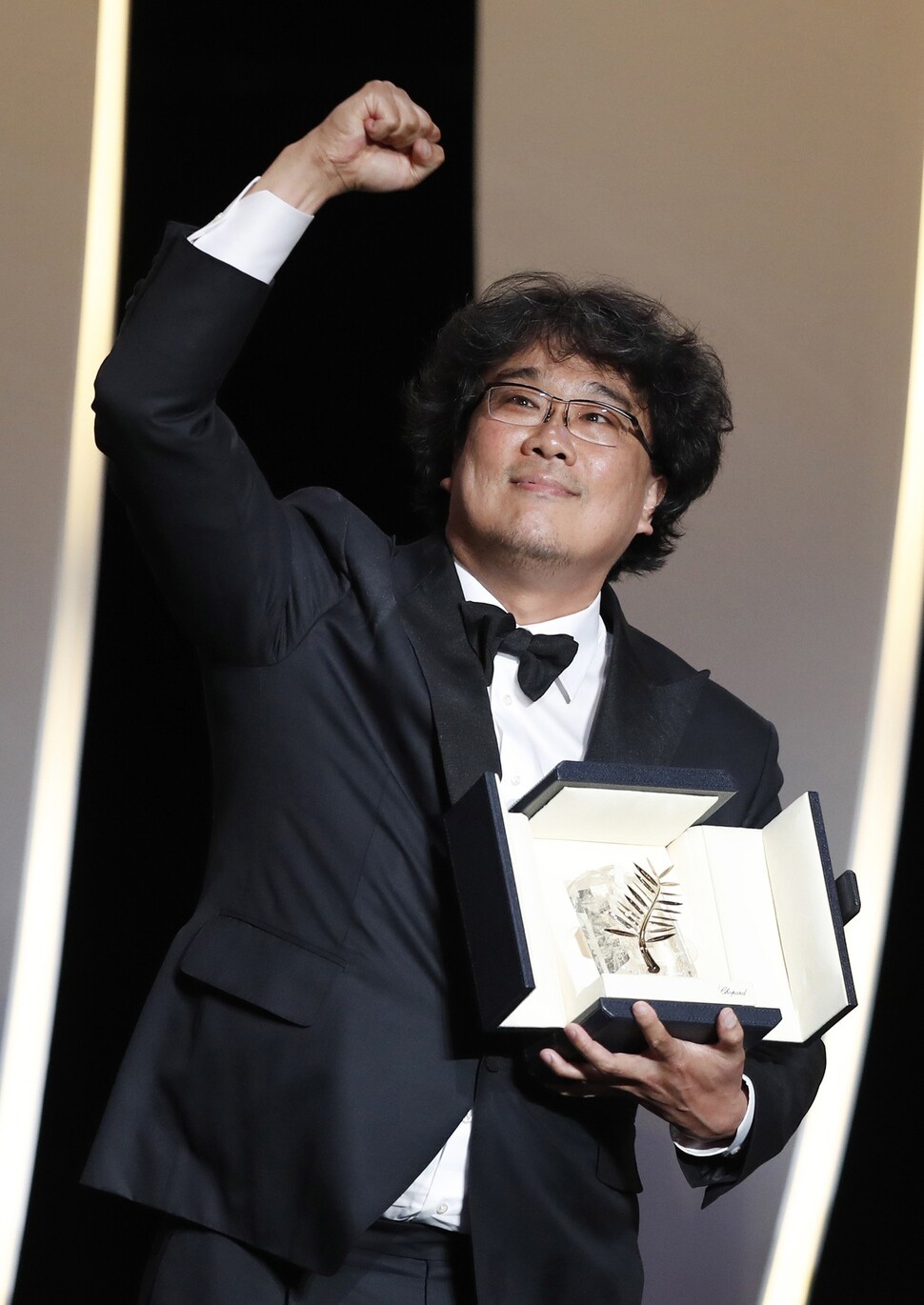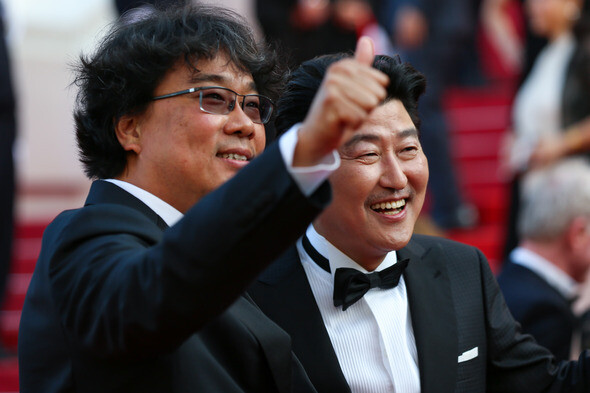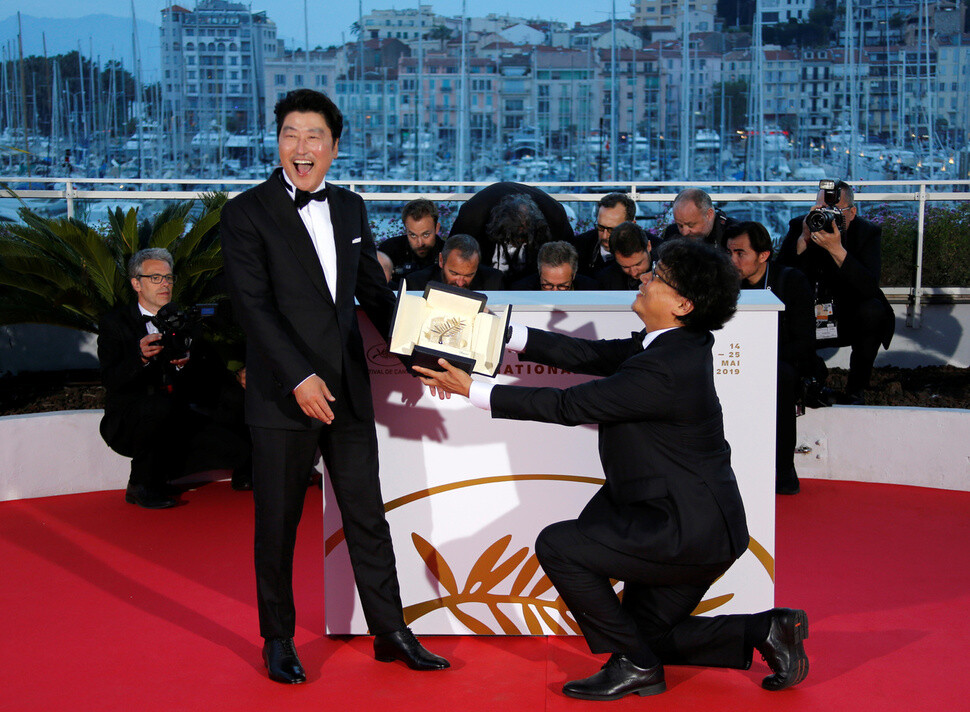hankyoreh
Links to other country sites 다른 나라 사이트 링크
Bong Joon-ho’s “Parasite” receives Cannes Film Festival’s Palme d’Or prize

“Rarely have I been as delighted by an award — a truly deserving filmmaker and a great guy [to] boot!”
That was the congratulatory message posted on Twitter by distinguished Mexican film director Guillermo del Toro shortly after Bong Joon-ho, South Korean film director, was awarded the Palme d’Or, at the 72nd Cannes Film Festival, on May 25.
Following its screening on the evening of May 21, Bong’s film “Parasite” was showered with praise, making it one of the early frontrunners for the Palme d’Or, the most prestigious prize awarded at Cannes.
The film was championed by the international press: the Guardian described it as a film that “gets its tendrils into you,” while the BBC said that “Bong — along with Tarantino and Almodóvar — has become a director who is a genre all of his own.”
The film even received the highest rating among films submitted for competition on a jury grid published by Screen Daily, a media outlet covering the film festival.

Because a large contingent on this year’s jury at Cannes favors lyrical and philosophical films, some film industry insiders thought a genre film like “Parasite” wasn’t likely to score highly. But Mexican filmmaker Alejandro González Iñárritu, who served as the president of the jury, said that Bong’s film was the jury’s unanimous choice. Jury members were apparently impressed not only with the film’s crowd-pleasing appeal but also its artistry and the resonance and gravity of its message. Critics believe that the film’s critical message about social polarization and inequality appealed to a wide audience.
“Bong has often tackled social issues such as poverty and disability in previous works such as ‘Memories of Murder’ and ‘Mother,’ and ‘Parasite’ offers an even blunter expression of such universal social themes. The film’s inversion of the relationship between the poor family and the rich family is a provocative plotting device that might be more effective in Europe,” said Kim Hyo-jeong, a film critic who saw “Parasite” at the festival.
The film has also been praised for its detail-oriented direction and its meticulous plotting, both of which are typical of Bong. “There were other films in the competition — such as ‘Sorry We Missed You,’ by Ken Loach — that dealt with the gap between the rich and poor, but in those films, the overall movie tended to be overshadowed by the message. But Bong created a very clever script in which the black comedy in the first hour gives way to a thriller in the second hour,” Kim said.

Bong’s success rooted in a century of Korean cinema
Bong’s triumph demonstrates the influence that Korean cinema has accumulated over the past century and is widely expected to help propel Korean cinema into the future. The diverse styles and sensibilities of directors such as Im Kwon-taek, Hong Sang-soo, Lee Chang-dong, and Park Chan-wook had made a deep impression at foreign festivals and paved the way for Bong to win the Palme d’Or. And even earlier, directors such as Kim Ki-young and Lee Man-hui caused Korean cinema to blossom in the politically and culturally barren soil of Korean society.
Bong has himself hinted that his own cinematic career is rooted in the Korean directors of an earlier generation. During a press conference on the evening of May 25, after news broke that Bong had won the Palme d’Or, the director mentioned a retrospective for the late Kim Ki-young that was held in France in 2006. “There have been many great directors in the history of Korean cinema, such as Kim Ki-young. I hope this will be a chance for many to learn that Korea has cinematic masters who surpass other Asian greats such as Akira Kurosawa and Zhang Yimou,” Bong said.
“Parasite” is also improving the prospects for the Korean film industry. During the Cannes festival, the film was sold to 192 countries around the world, spanning North and South America, Europe, Asia, and the Middle East, setting a new record for overseas sales of a Korean film.
“Korean blockbusters have been struggling recently, causing the industry as a whole to stagnate. Since the South Korean film industry has been in the doldrums, this award comes as welcome news,” said Yun Seong-eun, a film critic.
The Grand Prix at Cannes went to “Atlantics,” by black female director Mati Diop, while the Jury Prize was awarded to “Les Misérables,” directed by Ladj Ly, and “Bacurau,” directed by Kleber Mendonça Filho. The Best Performance by an Actor Prize went to Antonio Banderas in “Pain and Glory”; the Best Performance by an Actress Prize to Emily Beecham in “Little Joe”; the Best Director Prize to “Young Ahmed,” directed by the Dardenne brothers; and the Best Screenplay prize to “Portrait of Lady on Fire,” directed by Céline Sciamma.
By Yu Sun-hui, staff reporter, and Jang Yeong-yeob, Cine21 writer
Please direct comments or questions to [english@hani.co.kr]

Editorial・opinion
![[Editorial] Yoon must halt procurement of SM-3 interceptor missiles [Editorial] Yoon must halt procurement of SM-3 interceptor missiles](https://flexible.img.hani.co.kr/flexible/normal/500/300/imgdb/child/2024/0501/17145495551605_1717145495195344.jpg) [Editorial] Yoon must halt procurement of SM-3 interceptor missiles
[Editorial] Yoon must halt procurement of SM-3 interceptor missiles![[Guest essay] Maybe Korea’s rapid population decline is an opportunity, not a crisis [Guest essay] Maybe Korea’s rapid population decline is an opportunity, not a crisis](https://flexible.img.hani.co.kr/flexible/normal/500/300/imgdb/original/2024/0430/9417144634983596.jpg) [Guest essay] Maybe Korea’s rapid population decline is an opportunity, not a crisis
[Guest essay] Maybe Korea’s rapid population decline is an opportunity, not a crisis- [Column] Can Yoon steer diplomacy with Russia, China back on track?
- [Column] Season 2 of special prosecutor probe may be coming to Korea soon
- [Column] Park Geun-hye déjà vu in Yoon Suk-yeol
- [Editorial] New weight of N. Korea’s nuclear threats makes dialogue all the more urgent
- [Guest essay] The real reason Korea’s new right wants to dub Rhee a founding father
- [Column] ‘Choson’: Is it time we start referring to N. Korea in its own terms?
- [Editorial] Japan’s rewriting of history with Korea has gone too far
- [Column] The president’s questionable capacity for dialogue
Most viewed articles
- 1Months and months of overdue wages are pushing migrant workers in Korea into debt
- 2Trump asks why US would defend Korea, hints at hiking Seoul’s defense cost burden
- 3[Editorial] Yoon must halt procurement of SM-3 interceptor missiles
- 4At heart of West’s handwringing over Chinese ‘overcapacity,’ a battle to lead key future industries
- 5[Guest essay] Maybe Korea’s rapid population decline is an opportunity, not a crisis
- 61 in 3 S. Korean security experts support nuclear armament, CSIS finds
- 7Fruitless Yoon-Lee summit inflames partisan tensions in Korea
- 8First meeting between Yoon, Lee in 2 years ends without compromise or agreement
- 9Under conservative chief, Korea’s TRC brands teenage wartime massacre victims as traitors
- 10[Column] Park Geun-hye déjà vu in Yoon Suk-yeol